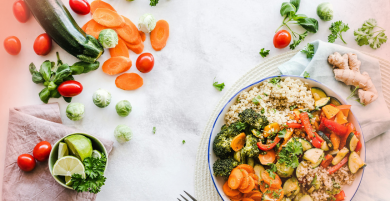Proper nutrition plays a crucial role in supporting overall health, especially during menstruation. In this comprehensive guide, we'll explore how nutritious food can benefit your body during periods and provide practical tips for maintaining a balanced diet. From foods to include in your meals to supplements to consider, we've got you covered with everything you need to know to nourish your body during your cycle.
How Can Nutritious Food Help During Periods?
During menstruation, your body undergoes various hormonal changes that can affect your energy levels, mood, and overall well-being. Eating a balanced diet rich in essential nutrients can help alleviate menstrual symptoms, boost energy, and support hormonal balance. By fueling your body with the right nutrients, you can better manage cravings, reduce bloating, and maintain stable blood sugar levels throughout your cycle.
Foods To Include In Your Diet During Periods
Eating the right foods during your period can help alleviate symptoms and support overall well-being. Here are some nutritious foods to include in your diet during menstruation for a smoother, more comfortable experience.
-
Iron-Rich Foods
Incorporate iron-rich foods such as lean meats, poultry, fish, beans, lentils, spinach, and fortified cereals to replenish iron lost during menstruation and prevent fatigue.
-
Omega-3 Fatty Acids
Include sources of omega-3 fatty acids like fatty fish (salmon, mackerel, sardines), flaxseeds, chia seeds, and walnuts to reduce inflammation and alleviate menstrual cramps.
-
Complex Carbohydrates
Choose complex carbohydrates such as whole grains, fruits, vegetables, and legumes to provide sustained energy and regulate blood sugar levels.
-
Calcium-Rich Foods
Opt for calcium-rich foods like dairy products, fortified plant-based milk, leafy greens, almonds, and tofu to support bone health and relieve PMS symptoms.
-
Vitamin D Sources
Ensure adequate vitamin D intake through sunlight exposure, fortified foods, fatty fish, eggs, and mushrooms to promote calcium absorption and mood regulation.
Foods To Avoid Or Limit
While certain foods can support your health during menstruation, others may exacerbate symptoms or discomfort. Here are some foods to avoid or limit during your period to help you feel your best.
-
Processed Foods
Minimise consuming processed foods, sugary snacks, and refined carbohydrates, as they can exacerbate bloating, fatigue, and mood swings.
-
Caffeine And Alcohol
Limit intake of caffeine and alcohol, as they can disrupt sleep patterns, exacerbate anxiety, and contribute to dehydration during menstruation.
-
Salty Foods
Reduce sodium intake from salty snacks, processed meats, and canned foods to prevent water retention and bloating.
-
Fatty And Fried Foods
Cut back on fried foods and saturated fats, as they can increase inflammation and worsen menstrual cramps.
Meal Planning Tips
Effective meal planning during periods can help ensure you're getting the nutrients your body needs while managing cravings and symptoms. Here are some helpful tips to guide you in preparing nutritious and satisfying meals during menstruation.
- Plan balanced meals that include a combination of lean proteins, complex carbohydrates, healthy fats, and fibre-rich foods.
- Incorporate a variety of colourful fruits and vegetables to ensure adequate intake of vitamins, minerals, and antioxidants.
- Prepare nutrient-dense snacks such as Greek yoghurt with berries, vegetable sticks with hummus, or nuts and seeds for healthy munching options.
- Stay hydrated by drinking plenty of water, herbal teas, and infused water throughout the day to support digestion and hydration.
Supplements To Take During Periods
Supplements can be beneficial additions to your diet during periods, providing extra support for your body's needs. Here are some supplements that you can consider to take during periods, but do ensure you consult with your doctor before taking them:
-
Iron Supplements
Consider taking iron supplements if you experience heavy menstrual bleeding or have low iron levels to prevent iron deficiency anemia.
-
Magnesium Supplements
Supplementing with magnesium may help reduce menstrual cramps, improve mood, and promote relaxation during menstruation.
-
Vitamin B6
Vitamin B6 supplements may help alleviate symptoms of PMS, including mood swings, bloating, and breast tenderness.
-
Omega-3 Supplements
If you don't consume enough omega-3 fatty acids from food sources, consider taking fish oil or algae-based omega-3 supplements to support menstrual health and reduce inflammation.
Nourishing your body with balanced meals is essential for a healthier period experience. By focusing on nutrient-rich choices, steering clear of potential triggers, and following simple meal-planning strategies, you can effectively manage period symptoms and feel your best throughout your cycle. Remember to listen to your body's unique cues and make necessary adjustments to support your menstrual health.

































































